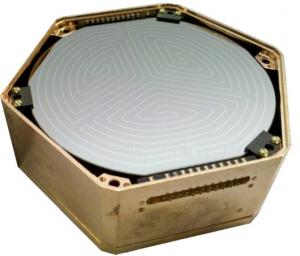Jul 23 2014
The SuperCDMS-SNOLAB project has been selected by U.S. funding agencies in the second generation (G2) program to search for “dark matter.” This means that the SuperCDMS experiment will be expanding to SNOLAB, Canada’s underground science laboratory specializing in neutrino and dark matter physics in Sudbury, Ontario.
PHAS Professors Scott Oser, Hirohisa Tanaka, and student Bill Page joined the SuperCDMS team in 2012 and will be in charge of data acquisition systems for the SuperCDMS-SNOLAB experiment.
 SuperCDMS Detector
SuperCDMS Detector
The mysterious dark matter constitutes more than 80% of all matter in the Universe. As it does not emit or scatter electromagnetic radiation, it cannot be seen – hence the name “dark matter.” Physicists hypothesized that dark matter consists of Weakly Interacting Massive Particles (WIMPs), but are yet to confirm their existence experimentally in this game of “hide-and-seek”.
The SuperCDMS-SNOLAB will bring together the best of two worlds: the state-of-the-art cryogenic germanium detectors in SuperCDMS, and the ability to shield cosmogenic events by operating in the underground SNOLAB. This will significantly increase the sensitivity of WIMP detection, and hopefully allow us to finally discover the presence of WIMPs – a discovery that could revolutionize the fields of Particle Physics and Cosmology.
Using highly sensitive detectors also means that there will be a large amount of experimental data to sift through. PHAS Professors Scott Oser and Hirohisa Tanaka, with graduate student Bill Page, are in charge of data acquisition systems for the experiment (the computing and software that read out the data from the SuperCDMS electronics), selecting out interesting events that might be dark matter interacting in the experiment and saving these events to a disk. The amount of data to be collected could be up to one petabyte. That is equivalent to 1000 terabyte or a million gigabyte of data. Talk about looking for the needle in a haystack!
UBC was a co-applicant on a successful CFI (Canada Foundation for Innovation) application that provides the Canadian contribution to the experiment. “We have been very pleased with the support that we have received within Canada from SNOLAB and from CFI,” said SuperCDMS-SNOLAB Collaboration spokesperson Dr. Blas Cabrera. “We look forward to a productive and exciting long partnership as we install and operate the experiment in the best underground laboratory in the world.”
Dr. Nigel Smith, SNOLAB Director, commented on brining this international collaboration to SNOLAB. “Researchers from around the world will be converging on Sudbury to build and operate this major project, including Canadian SuperCDMS collaborators at Queen’s University and University of British Columbia. We all look forward to welcoming the SuperCDMS collaboration to our facility, and helping them deliver new physics results from this exciting experiment.” His excitement was shared by Dr. Scott Oser. “SuperCDMS will have particularly good sensitivity to light WIMPS (if they exist!). The UBC group is thrilled to be part of the project, and welcomes SuperCDMS to Canada.”
Let the search continue!
SNOLAB is operated by the SNOLAB Institute whose member institutions are Carleton University, Laurentian University, Queen’s University, University of Alberta and Université de Montréal. It is located two kilometres below the surface in the Vale Creighton Mine near Sudbury, ON. Operational funding for SNOLAB is provided by the Canada Foundation for Innovation and the Province of Ontario.